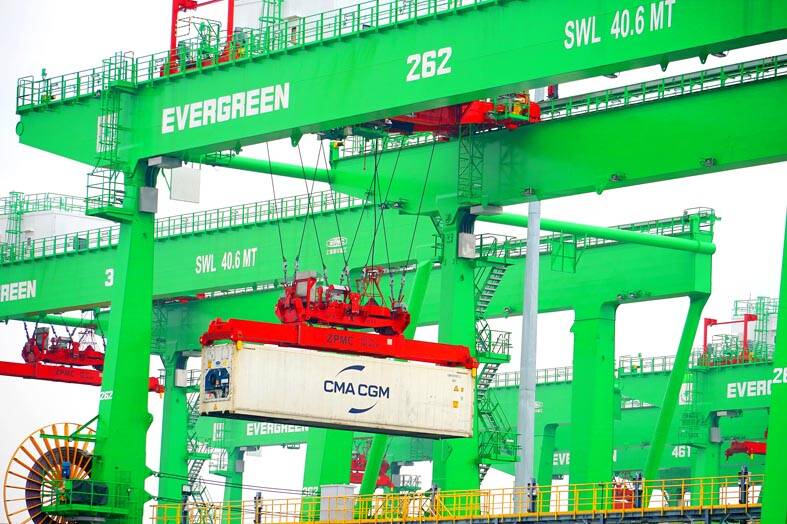Export orders last month grew for the eighth straight month at an annual rate of 4.9 percent, benefiting from rising demand for advanced chips used in artificial intelligence (AI) and high-performance computing (HPC) applications, the Ministry of Economic Affairs said yesterday.
Export orders expanded to US$55.45 billion last month, compared with US$52.87 billion a year earlier and marking the strongest level since September 2022, ministry data showed.
In the first 10 months, accumulated export orders totaled US$484.35 billion, up 3.8 percent annually, the data showed.

Photo: CNA
Orders for electronic products, including semiconductors, registered the fastest annual growth of 11.2 percent last month to US$20.91 billion, marking the best October performance. Orders for the US market surged 12.6 percent annually to US$19.15 billion, making it the fastest growing market in the month, the ministry said.
“Last month’s performance matched our expectations, mostly driven by the electronics segment, or mostly advanced chips. For the full year, we expect export orders to return to the annual growth path,” Department of Statistics Director Huang Yu-ling (黃于玲) said.
“What is more, the traditional industries are recovering, too, as reflected in last month’s figures. Their growth may look mild, but the uptrend is confirmed,” she added.
Export orders this month are expected to grow between 4.7 percent and 8.6 percent year-on-year to between US$53 billion and US$55 billion, the ministry said.
That would represent a sequential reduction of between 0.8 percent and 4.4 percent, in line with seasonal patterns, the ministry said.
“Advanced chips and AI servers are the growth drivers,” Huang said.
Information and communications technology products last month saw orders rise 0.5 percent annually to US$17.58 billion as strong demand for AI and cloud-based applications fueled demand for servers and networking equipment, the ministry said.
Orders for optronic products shrank 0.7 percent to US$1.66 billion last month, due to falling prices of TV display panels, but those for base metals advanced 7.4 percent to US$2.13 billion, thanks to rising demand for steel products, it said.
Orders for machinery products and mechanical equipment rose 5 percent to US$1.54 billion last month, primarily driven by robust demand for semiconductor manufacturing equipment and automation systems, the ministry said, adding that orders for machine tools dipped.
Orders for plastic and rubber products edged higher by 1.8 percent to US$1.54 billion last month attributable to the growth of rubber material and gloves, while plastic raw material demand sank due to competition from global rivals, the ministry said.
Chemical orders climbed 3.9 percent to US$1.39 billion last month, benefiting from rising demand for medicine and electronic chemicals, but petrochemical orders dropped on lower prices, it said.

Vincent Wei led fellow Singaporean farmers around an empty Malaysian plot, laying out plans for a greenhouse and rows of leafy vegetables. What he pitched was not just space for crops, but a lifeline for growers struggling to make ends meet in a city-state with high prices and little vacant land. The future agriculture hub is part of a joint special economic zone launched last year by the two neighbors, expected to cost US$123 million and produce 10,000 tonnes of fresh produce annually. It is attracting Singaporean farmers with promises of cheaper land, labor and energy just over the border.

US actor Matthew McConaughey has filed recordings of his image and voice with US patent authorities to protect them from unauthorized usage by artificial intelligence (AI) platforms, a representative said earlier this week. Several video clips and audio recordings were registered by the commercial arm of the Just Keep Livin’ Foundation, a non-profit created by the Oscar-winning actor and his wife, Camila, according to the US Patent and Trademark Office database. Many artists are increasingly concerned about the uncontrolled use of their image via generative AI since the rollout of ChatGPT and other AI-powered tools. Several US states have adopted

A proposed billionaires’ tax in California has ignited a political uproar in Silicon Valley, with tech titans threatening to leave the state while California Governor Gavin Newsom of the Democratic Party maneuvers to defeat a levy that he fears would lead to an exodus of wealth. A technology mecca, California has more billionaires than any other US state — a few hundred, by some estimates. About half its personal income tax revenue, a financial backbone in the nearly US$350 billion budget, comes from the top 1 percent of earners. A large healthcare union is attempting to place a proposal before

KEEPING UP: The acquisition of a cleanroom in Taiwan would enable Micron to increase production in a market where demand continues to outpace supply, a Micron official said Micron Technology Inc has signed a letter of intent to buy a fabrication site in Taiwan from Powerchip Semiconductor Manufacturing Corp (力積電) for US$1.8 billion to expand its production of memory chips. Micron would take control of the P5 site in Miaoli County’s Tongluo Township (銅鑼) and plans to ramp up DRAM production in phases after the transaction closes in the second quarter, the company said in a statement on Saturday. The acquisition includes an existing 12 inch fab cleanroom of 27,871m2 and would further position Micron to address growing global demand for memory solutions, the company said. Micron expects the transaction to